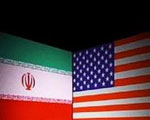 Dow Jones: Obama administration officials told a U.S. House hearing Wednesday that the U.S. sanctions strategy against Iran has made significant progress in isolating Tehran, but warned that vigilance is necessary to counter sanctions evasion.
Dow Jones: Obama administration officials told a U.S. House hearing Wednesday that the U.S. sanctions strategy against Iran has made significant progress in isolating Tehran, but warned that vigilance is necessary to counter sanctions evasion.
By Ian Talley
Of DOW JONES NEWSWIRES
 WASHINGTON (Dow Jones)–Obama administration officials told a U.S. House hearing Wednesday that the U.S. sanctions strategy against Iran has made significant progress in isolating Tehran, but warned that vigilance is necessary to counter sanctions evasion.
WASHINGTON (Dow Jones)–Obama administration officials told a U.S. House hearing Wednesday that the U.S. sanctions strategy against Iran has made significant progress in isolating Tehran, but warned that vigilance is necessary to counter sanctions evasion.
Just days ahead of new negotiations with Iran intended to halt the country’s alleged nuclear weapons program, a raft of lawmakers said they are concerned that violations of the new sanctions regime–particularly by Chinese companies–may be seriously undermining international efforts.
“The net result of all of the measures that we’ve applied in recent months is substantial,” said Under Secretary of State for Political Affairs William Burns told the House Committee on Foreign Affairs.
Burns and U.S. Treasury’s Under Secretary for Terrorism and Financial Intelligence Stuart Levey pointed to a raft of sanction successes and told the panel that Washington would continue to ratchet up sanctions pressure.
Out of seven companies that the State Department had been particularly focused on probing whether there are violations of existing sanctions laws, five promised to exit. Burns said several firms were under official investigation by the State Department and, while he didn’t say if the oil service company Schlumberger was one of them, he told lawmakers that it’s ongoing activities in Iran are of particular concern.
Burns said ahead of next week’s scheduled multilateral talks with Iran that the “door is still open” for serious negotiations. There’s “still time for diplomacy,” he said, but when asked if a military attack is still under consideration by the administration he said that no options have been taken off the table.
But lawmakers pressed the administration officials on multiple reports that several countries, especially China, were helping Tehran to evade sanctions and taking advantage of opportunities created by Western companies severing ties with Iran.
Ranking member of the committee, Ileana Ros-Lehtinen, (R., Fla.), said she’s concerned that the administration may repeat a history of waiving prosecuting companies in violation of sanction laws.
“The U.S. has known for years about Chinese energy investments in Iran, but only this past September did the administration initiate investigations of sanctionable activity yet still refuse to publicly disclose whether Chinese companies are among the targets,” Ros-Lehtinen said.
Committee Chairman Howard Berman, (D., Calif.), expressed similar worries: “I’m concerned that we will not be able to sustain a robust sanctions regime if we don’t impose sanctions in an even-handed manner,” particularly highlighting Chinese companies.
“What kind of message do we send if we fail to sanction companies that are transparently engaged in sanctionable activities?” Berman asked Burns and Levey.
Burns said President Barack Obama and his lieutenants are continuing to press China on its Iran ties at the highest level, including in Obama’s last meeting with Chinese President Hu Jintao.
The State Department official–the administration’s lead negotiator on the Iran issue–said companies such as Royal Dutch Shell, Total, ENI, StatoilHydro, INPEX, Reliance, and Toyota had committed to exiting Iran, many finalizing operations within weeks.
Washington is in a delicate diplomatic position. China, a member of the United Nations Security Council, is critical of the administration’s efforts to contain Iran’s and North Korea’s nuclear ambitions, aside from addressing a long list of other geopolitical, economic and trade issues. Hu is planning a trip to Washington in January.
To illustrate the progress of the sanctions, Treasury’s Levey and Burns pointed to an 85% drop in refined petroleum imports in Iran, down to 19,000 barrels a day in October, a loss of $50 billion to $60 billion in energy investments and increased difficulties for Iranian companies to conduct business in dollars and euros.
Given that Iran relies heavily on refined petroleum product imports and the impact of financial sanctions, Tehran was facing a political bind internally, needing to cut the gasoline subsidy, but fearing the political opposition from such an action.
-By Ian Talley, Dow Jones Newswires, 202-862-9285; [email protected]


